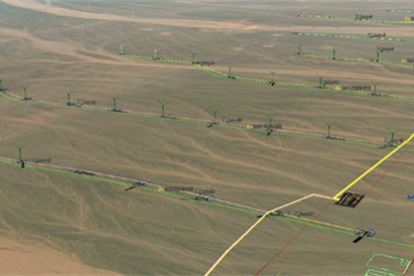Bonn talks crucial to climate guidelines

Clarity on, and balanced progress in, Paris Agreement work program items will determine whether conference is a success
The latest United Nations talks on climate change opened on Nov 6 in Bonn, Germany. The UN title of the meeting was the 23rd Session of the Conference of Parties to the United Nations Framework Convention on Climate Change.
The conference is historic. This is the first time that Fiji, as the first Pacific nation, holds the presidency and that, in a historic arrangement, the conference is held in Bonn, Germany, instead of the presidency's country.
At the 2015 Paris climate change conference, the landmark Paris Agreement was reached. According to the Paris Agreement work program, this Fiji/Bonn conference is expected to discuss rules and processes related to implementing the Paris Agreement, due for completion by the 24th Session of the Conference of Parties in late 2018. This implies that this conference is essentially a transitional one, because many issues discussed cannot be decided at this conference.

However, because it is the first UN climate change conference in the wake of the announcement by the United States of its intention to withdraw from the Paris Agreement, it is considered essential for keeping up the momentum and cooperative spirit built in the Paris climate change negotiations. Moreover, countries still need to work out robust guidelines to fully implement the Paris Agreement. Taken together, this conference is a crucial step toward that goal.
The Paris Agreement aims to strengthen the global response to the threat of climate change by keeping a global temperature rise this century well below 2 C above pre-industrial levels and to pursue efforts to limit the temperature increase even further to 1.5 C.
While the agreement establishes legally binding obligations of conduct, it does not establish a legally binding obligation for countries to achieve their contributions. Negotiators need to work on details of the agreement and put in place a process to design the rules and processes that will guide countries in fulfilling their existing climate commitments and scaling up their commitments over time.
Under the Paris Agreement, all parties have outlined their climate action plans, known as "nationally determined contributions", or NDCs, to be implemented starting in 2020 and expected to be scaled up over time. Moreover, under the agreement, countries will be mandated to submit updated NDCs every five years, with parties expected to progress in the levels of ambition in each round in line with their national circumstances.

However, the current NDCs have inconsistent time frames. Some are within 2020-30, while others are for the period of 2020-25. Countries need to agree on the common time frames in order to evaluate the ambition on an equal time footing, taking into consideration the pros and cons of five-and 10-year time frames.
This year's UN Environment Emissions Gap report finds that current NDCs will only reduce emissions by a third of what is required by 2030. Even with their full implementation, a temperature increase of at least 3 C by 2100 is very likely.
Countries agreed to start in 2018 a facilitative dialogue to take stock. Negotiators need to decide how the 2018 process will proceed. Any rules and processes, once agreed upon, will help to assess where countries stand both individually and collectively in terms of meeting their individual pledges and the collective target and lay out updated national climate plans to accelerate climate action and close the emissions gap.
Transparency on the implementation of countries' contributions is the backbone of the Paris Agreement, which for the first time establishes a universal transparency system. This new system substantially increases the transparency requirements for mitigation actions by developing countries, and, at the same time, meets the developing countries' demand for including adaptation and increasing transparency in developed countries' provision of support.
In designing an enhanced transparency framework, negotiators need to strike a balance between common guidelines and flexibility. On the one hand, common guidelines are applied for all countries regarding what information should be included and how countries can improve the quality of their reported information over time. On the other hand, flexibility allows different responsibilities from developing countries based on their national circumstances and capacity constraints.
Financial support from developed countries has been a key issue of great concern to developing countries. At the Paris climate change conference, China proposed and insisted on "a concrete road map" to scale up the level of pre-2020 financial support by developed countries to achieve the goal of jointly providing $100 billion (85.6 billion euros; £76.3 billion) annually by 2020 for mitigation and adaptation. China also insisted on "making finance flows consistent with a pathway toward low greenhouse gas emissions and climate-resilient development".
However, developing countries consider the financing part of the Paris Agreement to be too weak, since it does not contain any compulsory language to scale up climate finance, and they demand that it be strengthened in subsequent negotiations. On behalf of developed countries, Australia and the United Kingdom delivered a road map for meeting the collective target of $100 billion per year by 2020.
However, this road map report as well as the widely debated climate finance report produced by the Organization for Economic Cooperation and Development overestimate the net climate support provided to developing countries. Both reports also reveal the persistent neglect of adaptation needs in the poorest countries. The Paris Agreement specifies a balance between climate mitigation and adaptation. While balance could be interpreted differently, by any standards, 80 percent versus 20 percent of international climate finance, respectively, for mitigation and adaptation would not be considered a balance between climate mitigation and adaptation.
Negotiators still need to agree on what should be included in climate financing, how best to account for climate financing, and what the next steps are to both increase funding for measures to build resilience to climate impacts and how to balance climate mitigation and adaptation.
Countries agreed at the 2016 Marrakech UN Climate Change Conference that the Adaptation Fund should serve the Paris Agreement. Work is needed to address the issues related to governance and institutional arrangements, safeguards and operating modalities as well as the relationship to market mechanisms, according to the Paris Agreement.
The aforementioned issues are among the items of the Paris Agreement work program. Clearly, serious efforts are needed by the 23rd Session of the Conference of Parties to stay on track for finalizing the Paris implementation guidelines at the 24th session next year to lay the groundwork for collective progress toward the Paris goals.
Although the US announced its intention to withdraw from the Paris Agreement, it cannot officially get what it wants until at least November 2020. Therefore, the US could still exert some influence in the course of international climate negotiations. Given that this conference is transitional, there is a great risk of making slow progress in this conference and then loading too many items on the agenda for the 24th Session.
Therefore, China emphasizes that at this conference, ending on Nov 17, there should be substantive, balanced progress on all items (including pre-2020 action and ambition) of the Paris Agreement work program. China is working with the European Union and the global community to keep the US withdrawal's potential damage to a minimum and to steer climate change negotiations toward completing the nuts-and-bolts decisions needed to fully implement the Paris Agreement. Whether countries will leave Bonn with clarity on, and balanced progress in, all these work program items will determine whether the conference is a success.
The author is dean and professor of the Ma Yinchu School of Economics at Tianjin University and director of the China Academy of Energy, Environmental and Industrial Economics. The views do not necessarily reflect those of China Daily.
(China Daily Africa Weekly 11/17/2017 page10)
Today's Top News
- China's annual express delivery volume tops 170 billion
- Recruiters seek overseas graduates
- 2025 a crucial year to reflect on history
- Beijing, Washington agree to manage differences
- RMB expected to stay resilient, rebound despite headwinds
- 'Ice City' warms up for winter Games






























